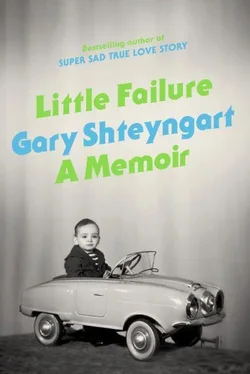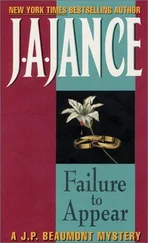What do you think, honey , I want to say. Do you think a Shitfart gets to share a bed?
All my life I’ve tried not to think of that misspelled “Shteyngart” as a pungent waste product of history. The correct name had to be Steingarten, or Stone Garden, which is as beautifully Zen as a German Jewish name can get, a name offering the kind of serenity and peace that none of my Hebrew ancestors had surely ever experienced in their short, explosive lifetimes. Stone Garden. As if.
Recently I found out from my father that Shteyngart is not our name at all. A slip of the pen in some Soviet official’s hand, a drunk notary, a semiliterate commissar, who knows, but I am not really Gary Shteyngart. My family name is — Steinhorn. Meaning “Stone Horn.” Though I was born Igor — my name was changed to Gary in America so that I would suffer one or two fewer beatings — my Leningrad birth certificate should have welcomed into this world one Citizen Igor Stone Horn. I have clearly spent thirty-nine years unaware that my real destiny was to go through life as a Bavarian porn star, but some further questions present themselves: If neither Gary nor Shteyngart is truly my name, then what the hell am I doing calling myself Gary Shteyngart? Is every single cell in my body a historical lie?
“Just don’t write like a self-hating Jew,” my father is whispering into my ear.

The Stone Horns inhabit the Ukrainian town of Chemirovets, where my father’s paternal grandfather was killed for no good reason in the 1920s. My father’s grandmother was left to fend for herself and a family of five children. There was not enough to eat. Those who could went up to Leningrad, Russia’s former imperial capital and second most important city once the Bolsheviks crowned Moscow as the capital. There, they mostly died, too. They were a deeply religious clan, but the Soviets took that from them as well, before they took what little else remained.
On the maternal side of my father’s family, the Millers lived in the nearby Ukrainian village of Orinino, population about one thousand souls. My father visited Orinino once in the 1960s, where he found a handful of hospitable Jews to talk genocide with, but I’ve never been on a shtetl pilgrimage. I envision a town that isn’t down on its luck, because it never had any luck to begin with; a postagricultural, post-Soviet village, clapboard houses missing large sections of, well, clapboard, women bearing tubs of yellowish water from a local pump, a man pulling a South Korean TV/VCR combo in a donkey cart, a dazed rooster stumbling along some main thoroughfare — inevitably Lenin or Soviet Street — toward that little hill just outside of town where all the Jews lie safely in a nice long burial mound, never to bother anyone with their alien Yiddish, their dour garb and kosher butcheries. But this is just an author’s imagination. Perhaps it’s nothing like that. Perhaps.
In addition to the Millers and the Stone Horns, the other surnames to track in this family drama are Stalin and Hitler. As I march my relatives onto the pages of this book, please remember that I am also marching them toward their graves and that they will most likely meet their ends in some of the worst ways imaginable.
But they don’t have to wait for the Second World War to start. The good times are already rolling in the 1920s. While my great-grandpa Stone Horn is being killed in one part of the Ukraine, Great-grandpa Miller is being killed in another part. The Millers are not a poor family. Their main source of income is one of the largest houses in town, which they have turned into a coach inn. Farmers and merchants coming to the local fair shelter their horses and oxen with my great-grandparents. They are probably as rich as anyone on that side of my family has ever been, until nearly a hundred years later, in 2013, I lease myself a Volvo. One bitter Eastern European night, Great-grandpa Miller is riding home with a great deal of Jewish money in his saddlebag, when one of the many criminal bands roaming freely across the Ukraine in the chaos following the 1917 Revolution murders him. The Millers are ruined.

In order for me to be born, all four branches of my family have to end up in Leningrad, trading in their tiny towns and villages for that somber, canal-laced cityscape. Here’s how it happens.
In 1932 Stalin decrees that the inhabitants of the Ukraine should pretty much fucking starve to death, leading to the elimination of an estimated six to seven million citizens, Christians, Jews, anyone who has a stomach that can’t be filled with rye. My great-grandmother sends her starving seven-year-old daughter, Fenya, to an orphanage in Leningrad. Fenya and my grandmother are among the three Miller siblings out of nine who will survive World War II. Some will die fighting at the front against the invading Germans; some will die at the hands of the SS and their Ukrainian colleagues; at least one will, poignantly, “lose her mind,” according to my father, and die before the war even gets properly started.
Polina, or Babushka (Grandma) Polya as I knew her, arrives in Leningrad in the 1930s when she is fourteen years old. In three novels I have written about the immigrant experience in the final years of the twentieth century with a sense of righteous ownership. But my parents came to this country stuffed with advanced degrees and keen to master the universal language of English. As for me, I was merely seven and expected to succeed wildly in a country we thought of as magical but whose population did not strike us as being especially clever.
But back in the 1930s my grandma Polya is a true immigrant. She comes to Leningrad as a Yiddish- and Ukrainian-speaking teenager, without knowledge of Russian or city life. Somehow, she gets herself admitted to the Teacher’s Technical College, a two-year school, where a kindly instructor takes pity on her and helps her master the tongue of Pushkin and Dostoyevsky. I always thought that both of my grandmothers struggled against the despised Jewish accent, the Ghhhh sound in place of the strong Russian RRRRRR , but when I bring it up with my father, he says emphatically: “Your grandmother never had a Jewish accent.” Still, whenever I try to flaunt my hard-perfected English, whenever my new language comes pouring out of me, I think of her.

After finishing the teachers college, Grandma is sent to work in an orphanage, known euphemistically as a children’s home ( detskii dom ), in a Leningrad suburb. Stalin’s Great Purge, a political bloodletting with few equals in human history, is hitting its peak, and some of the Soviet Union’s finest people are being shot outright or packed onto trains and sent eastward to the labor camps. Other fine people are allowed to starve to death in their homes. The children of the tortured and the dead are often sent to the “children’s homes” that dot the land, and Grandma Polya, by age seventeen, is already employed as a teacher and disciplinarian. By the age of twenty she is the deputy director of the orphanage. She is murderously tough as only the daughter of a murdered Jewish coach-inn owner can be, but if I, her grandson, can attest to one fact that I know is true beyond all others, it is this: She loved children.
As my grandmother is settling into life in the big city, the great Jewish express from the Ukrainian countryside delivers up to Leningrad my grandfather, Isaac Stone Horn, who has by now been rechristened Shteyngart. Grandpa Isaac is from a village close to Grandma Polya’s, and the humid ties of Judaism bring them together in the cold imperial capital in 1936. Some fifty-five-odd years later I am at a seminar table at Oberlin College. Our small class, with its combined $1,642,800 of annual tuition and fees, is dutifully discussing the travails of that mysterious but glorious working class we’ve heard so much about, but what I’m not quite realizing is that my grandpa Isaac was an honest-to-goodness common worker, and I, by extension, am the grandson of an honest-to-goodness common worker.
Читать дальше













